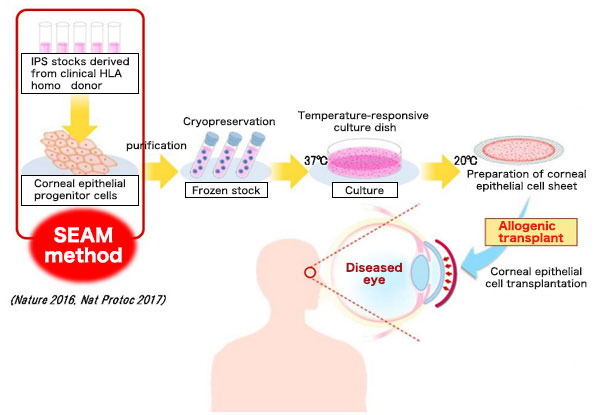News
Osaka University to Conduct First iPS Corneal Transplant: A Solution to Overcome Donor Shortage Updated in November 2019
On August 29, research group at Osaka University announced that they conducted the world's first transplant using sheet-shaped corneal tissue prepared from iPS cells (artificial pluripotent stem cells). The procedure was performed on a female patient who has been blinded due to a severe corneal disease.
This pioneering clinical study was carried out by a group led by professor of ophthalmology, Koji Nishida at Osaka University Graduate School of Medicine. The patient was a woman in her 40s who suffered from corneal epithelial stem cell exhaustion which can result in vision loss and blindness. Professor Nishida and colleagues created corneal cells from another individual’s iPS cells stored at Kyoto University, cultured them into thin sheet-like corneal tissues, and transplanted it to the eye of the female patient in late July. The transplant ended successfully and she was discharged on August 23.
In the future, the patient's progress will be carefully monitored. If there are no problems with postoperative conditions or vision recovery, a second transplant will be conducted by the end of this year. This clinical study was officially approved in March by an expert group of the Ministry of Health, Labor and Welfare (MHLW).
The cornea is on the outermost side of the eyeball and acts as a lens that covers the surface of the black eye. Corneal illness is usually treated with donated cornea from the deceased, but there are many patients nationwide waiting for donation. Donor shortage has continued for a long time. Moreover, there were risks of rejection after the transplant. If this method can spread widely, it will help overcome shortage of donors.
In 2016, Prof. Nishida and others succeeded in making cells of the major parts of the eye from iPS cells: cornea, lens, and retina. The cornea was successfully transplanted to rabbits and therapeutic effects were confirmed.
In clinical application of iPS cells, RIKEN and others conducted the world's first clinical study to transplant eye retinal cells into patients in 2014. Later in 2018, a Kyoto University group conducted a clinical trial to transplant neurons into brains of Parkinson's disease patients.
Prof. Shinya Yamanaka, who is currently the Director of the Center for iPS Cells Research and Application (CiRA) at Kyoto University, has successfully created iPS cells for mice in 2006 and for humans in 2007. In 2012 he won the Nobel Prize in Physiology. Research on regenerative medicine and drug discovery are also underway in this field.








